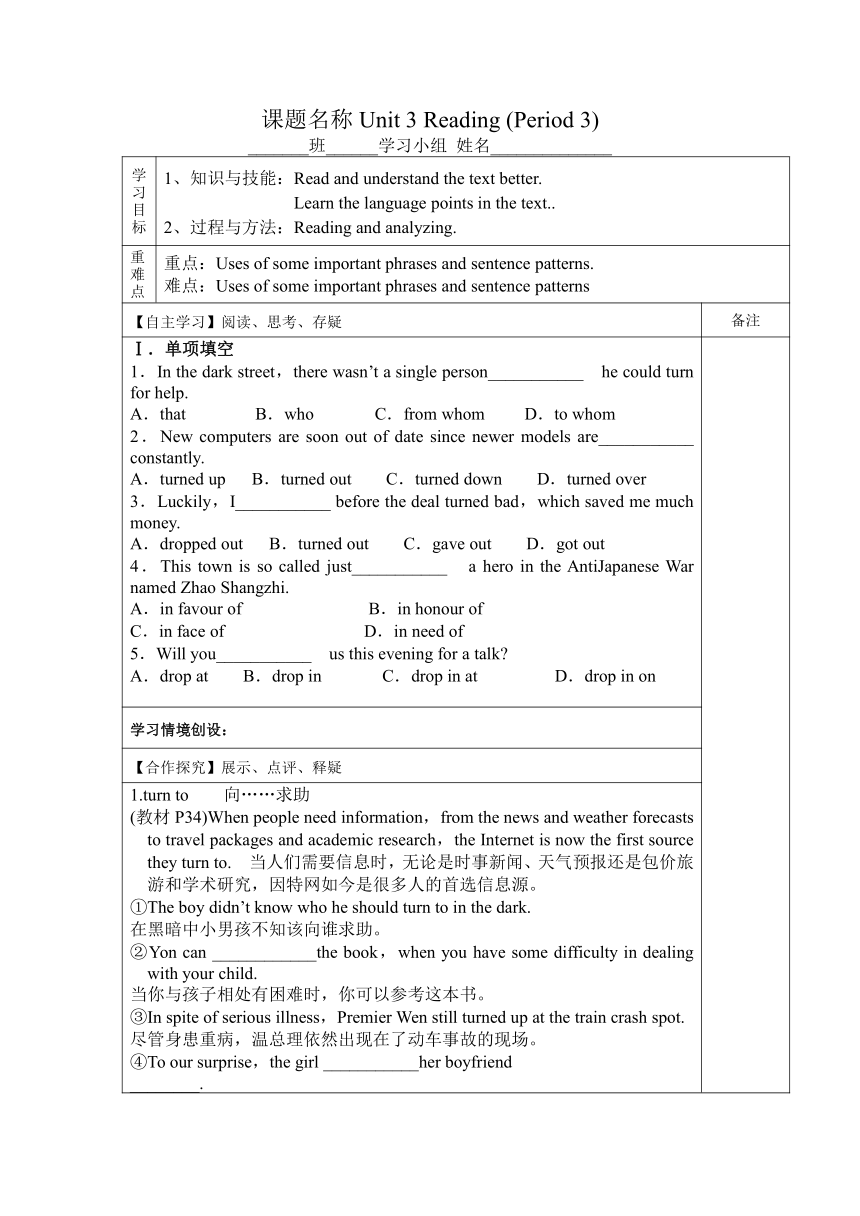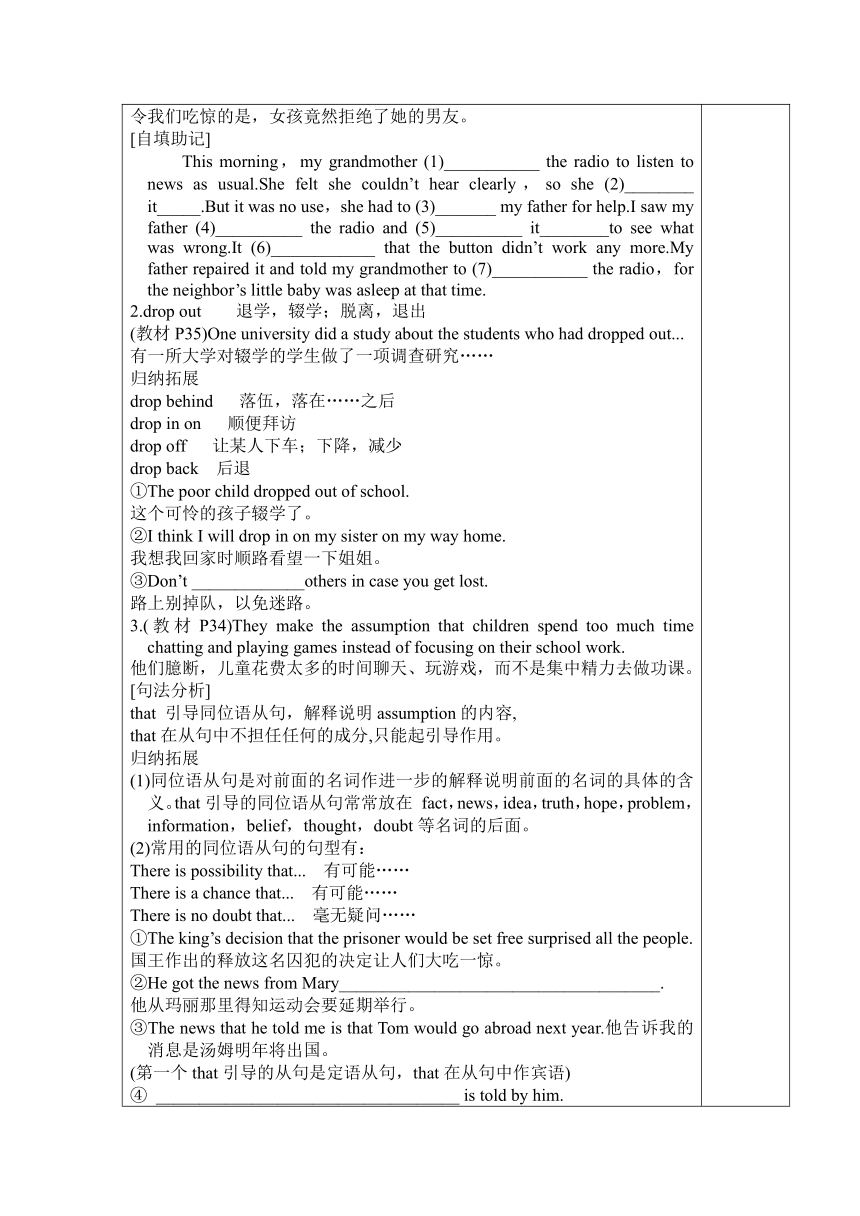译林版选修七:Unit3 The world online Reading(Period3)学案(无答案)
文档属性
| 名称 | 译林版选修七:Unit3 The world online Reading(Period3)学案(无答案) |

|
|
| 格式 | doc | ||
| 文件大小 | 48.5KB | ||
| 资源类型 | 教案 | ||
| 版本资源 | 牛津译林版 | ||
| 科目 | 英语 | ||
| 更新时间 | 2021-12-27 00:03:35 | ||
图片预览


文档简介
课题名称Unit 3 Reading (Period 3)
_______班______学习小组 姓名______________
学习目标 1、知识与技能:Read and understand the text better.Learn the language points in the text..2、过程与方法:Reading and analyzing.
重难点 重点:Uses of some important phrases and sentence patterns.难点:Uses of some important phrases and sentence patterns
【自主学习】阅读、思考、存疑 备注
Ⅰ.单项填空 1.In the dark street,there wasn’t a single person___________ he could turn for help.A.that B.who C.from whom D.to whom2.New computers are soon out of date since newer models are___________ constantly.A.turned up B.turned out C.turned down D.turned over 3.Luckily,I___________ before the deal turned bad,which saved me much money.A.dropped out B.turned out C.gave out D.got out4.This town is so called just___________ a hero in the Anti Japanese War named Zhao Shangzhi.A.in favour of B.in honour ofC.in face of D.in need of5.Will you___________ us this evening for a talk A.drop at B.drop in C.drop in at D.drop in on
学习情境创设:
【合作探究】展示、点评、释疑
1.turn to 向……求助(教材P34)When people need information,from the news and weather forecasts to travel packages and academic research,the Internet is now the first source they turn to. 当人们需要信息时,无论是时事新闻、天气预报还是包价旅游和学术研究,因特网如今是很多人的首选信息源。①The boy didn’t know who he should turn to in the dark.在黑暗中小男孩不知该向谁求助。②Yon can ____________the book,when you have some difficulty in dealing with your child.当你与孩子相处有困难时,你可以参考这本书。③In spite of serious illness,Premier Wen still turned up at the train crash spot.尽管身患重病,温总理依然出现在了动车事故的现场。④To our surprise,the girl ___________her boyfriend________.令我们吃惊的是,女孩竟然拒绝了她的男友。[自填助记]This morning,my grandmother (1)___________ the radio to listen to news as usual.She felt she couldn’t hear clearly,so she (2)________ it_____.But it was no use,she had to (3)_______ my father for help.I saw my father (4)__________ the radio and (5)__________ it________to see what was wrong.It (6)____________ that the button didn’t work any more.My father repaired it and told my grandmother to (7)___________ the radio,for the neighbor’s little baby was asleep at that time.2.drop out 退学,辍学;脱离,退出(教材P35)One university did a study about the students who had dropped out...有一所大学对辍学的学生做了一项调查研究……归纳拓展drop behind 落伍,落在……之后drop in on 顺便拜访drop off 让某人下车;下降,减少drop back 后退①The poor child dropped out of school.这个可怜的孩子辍学了。②I think I will drop in on my sister on my way home.我想我回家时顺路看望一下姐姐。③Don’t _____________others in case you get lost.路上别掉队,以免迷路。3.(教材P34)They make the assumption that children spend too much time chatting and playing games instead of focusing on their school work. 他们臆断,儿童花费太多的时间聊天、玩游戏,而不是集中精力去做功课。[句法分析]that 引导同位语从句,解释说明assumption的内容,that在从句中不担任任何的成分,只能起引导作用。归纳拓展(1)同位语从句是对前面的名词作进一步的解释说明前面的名词的具体的含义。that引导的同位语从句常常放在 fact,news,idea,truth,hope,problem,information,belief,thought,doubt等名词的后面。(2)常用的同位语从句的句型有:There is possibility that... 有可能……There is a chance that... 有可能……There is no doubt that... 毫无疑问……①The king’s decision that the prisoner would be set free surprised all the people.国王作出的释放这名囚犯的决定让人们大吃一惊。②He got the news from Mary_____________________________________.他从玛丽那里得知运动会要延期举行。③The news that he told me is that Tom would go abroad next year.他告诉我的消息是汤姆明年将出国。(第一个that引导的从句是定语从句,that在从句中作宾语)④ ___________________________________ is told by him.汤姆将出国的消息是他讲的。4.(教材P34)Without the Internet,these people would have fewer avenues to meet people.如果没有因特网,这些人与别人交往的途径就会更少。归纳拓展(1)without的这种用法既可表示与现在的事实相反的假设(主句中用would/could/might/should do),也可表示与过去的事实相反的假设(主句中用would/could/might/should have done)。(2)连词or/otherwise否则,词组but for 要不是……,也有类似without的用法。 ①Man couldn’t live without water.(=if there were no water)没有水人类就不能生存。②I could not have finished the work so soon without your help.(=if you had not helped me)如果没有你的帮助,我不会这么快完成这项工作。③But for your assistance,we ____________________________.要不是你的帮忙,我们是不会完成的。④He fled away,or/otherwise he would have been killed.=He fled away.If ________________,he ______________________.他逃走了,否则,他会丧命的。5.(教材P35)I feel it is important for us either to limit our use of the Internet,or to learn how to handle the problems it has caused. 我认为,重要的是我们要么限制使用因特网,要么学会如何解决它所引起的问题。[句法分析]either...or...意为“或者……或者……(表示两个或两个以上的可能性或选择)”,常用来连接并列句或并列成分.归纳拓展(1)either...or...连接并列主语时,其谓语动词应与邻近的那个主语在人称和数上保持一致。(2)either...or...,neither...nor...,not only...but also...谓语动词用就近原则。①Either you or she is wholly right.你和她有一方完全正确。②You can contact us ______by phone ____by email.你可以通过电话或电子邮件来联系我们。③Either he forgot the meeting or he deliberately stayed away—I don’t know which.要么是他忘了开会,要么是他故意躲开,我不清楚是哪一种情况。④ _______________________ good at drawing.你和她都不擅长绘画。6.(教材P34)What is more,people who are disabled and must stay in their homes can correspond and communicate with others around the globe who have similar interests.更重要的是,身有残疾而必须待在家里的人也能(通过因特网)与全球各地趣味相投的人们通信、交流。[句法分析]what is more意为“更有甚者,更为重要的是”。在句中作插入语,是句子的独立成分。归纳拓展that is to say 换言之,也就是说to tell(you)the truth 说实话judging from/by 根据……来判断generally speaking 一般来说believe it or not 信不信由你
收获与反思
_______班______学习小组 姓名______________
学习目标 1、知识与技能:Read and understand the text better.Learn the language points in the text..2、过程与方法:Reading and analyzing.
重难点 重点:Uses of some important phrases and sentence patterns.难点:Uses of some important phrases and sentence patterns
【自主学习】阅读、思考、存疑 备注
Ⅰ.单项填空 1.In the dark street,there wasn’t a single person___________ he could turn for help.A.that B.who C.from whom D.to whom2.New computers are soon out of date since newer models are___________ constantly.A.turned up B.turned out C.turned down D.turned over 3.Luckily,I___________ before the deal turned bad,which saved me much money.A.dropped out B.turned out C.gave out D.got out4.This town is so called just___________ a hero in the Anti Japanese War named Zhao Shangzhi.A.in favour of B.in honour ofC.in face of D.in need of5.Will you___________ us this evening for a talk A.drop at B.drop in C.drop in at D.drop in on
学习情境创设:
【合作探究】展示、点评、释疑
1.turn to 向……求助(教材P34)When people need information,from the news and weather forecasts to travel packages and academic research,the Internet is now the first source they turn to. 当人们需要信息时,无论是时事新闻、天气预报还是包价旅游和学术研究,因特网如今是很多人的首选信息源。①The boy didn’t know who he should turn to in the dark.在黑暗中小男孩不知该向谁求助。②Yon can ____________the book,when you have some difficulty in dealing with your child.当你与孩子相处有困难时,你可以参考这本书。③In spite of serious illness,Premier Wen still turned up at the train crash spot.尽管身患重病,温总理依然出现在了动车事故的现场。④To our surprise,the girl ___________her boyfriend________.令我们吃惊的是,女孩竟然拒绝了她的男友。[自填助记]This morning,my grandmother (1)___________ the radio to listen to news as usual.She felt she couldn’t hear clearly,so she (2)________ it_____.But it was no use,she had to (3)_______ my father for help.I saw my father (4)__________ the radio and (5)__________ it________to see what was wrong.It (6)____________ that the button didn’t work any more.My father repaired it and told my grandmother to (7)___________ the radio,for the neighbor’s little baby was asleep at that time.2.drop out 退学,辍学;脱离,退出(教材P35)One university did a study about the students who had dropped out...有一所大学对辍学的学生做了一项调查研究……归纳拓展drop behind 落伍,落在……之后drop in on 顺便拜访drop off 让某人下车;下降,减少drop back 后退①The poor child dropped out of school.这个可怜的孩子辍学了。②I think I will drop in on my sister on my way home.我想我回家时顺路看望一下姐姐。③Don’t _____________others in case you get lost.路上别掉队,以免迷路。3.(教材P34)They make the assumption that children spend too much time chatting and playing games instead of focusing on their school work. 他们臆断,儿童花费太多的时间聊天、玩游戏,而不是集中精力去做功课。[句法分析]that 引导同位语从句,解释说明assumption的内容,that在从句中不担任任何的成分,只能起引导作用。归纳拓展(1)同位语从句是对前面的名词作进一步的解释说明前面的名词的具体的含义。that引导的同位语从句常常放在 fact,news,idea,truth,hope,problem,information,belief,thought,doubt等名词的后面。(2)常用的同位语从句的句型有:There is possibility that... 有可能……There is a chance that... 有可能……There is no doubt that... 毫无疑问……①The king’s decision that the prisoner would be set free surprised all the people.国王作出的释放这名囚犯的决定让人们大吃一惊。②He got the news from Mary_____________________________________.他从玛丽那里得知运动会要延期举行。③The news that he told me is that Tom would go abroad next year.他告诉我的消息是汤姆明年将出国。(第一个that引导的从句是定语从句,that在从句中作宾语)④ ___________________________________ is told by him.汤姆将出国的消息是他讲的。4.(教材P34)Without the Internet,these people would have fewer avenues to meet people.如果没有因特网,这些人与别人交往的途径就会更少。归纳拓展(1)without的这种用法既可表示与现在的事实相反的假设(主句中用would/could/might/should do),也可表示与过去的事实相反的假设(主句中用would/could/might/should have done)。(2)连词or/otherwise否则,词组but for 要不是……,也有类似without的用法。 ①Man couldn’t live without water.(=if there were no water)没有水人类就不能生存。②I could not have finished the work so soon without your help.(=if you had not helped me)如果没有你的帮助,我不会这么快完成这项工作。③But for your assistance,we ____________________________.要不是你的帮忙,我们是不会完成的。④He fled away,or/otherwise he would have been killed.=He fled away.If ________________,he ______________________.他逃走了,否则,他会丧命的。5.(教材P35)I feel it is important for us either to limit our use of the Internet,or to learn how to handle the problems it has caused. 我认为,重要的是我们要么限制使用因特网,要么学会如何解决它所引起的问题。[句法分析]either...or...意为“或者……或者……(表示两个或两个以上的可能性或选择)”,常用来连接并列句或并列成分.归纳拓展(1)either...or...连接并列主语时,其谓语动词应与邻近的那个主语在人称和数上保持一致。(2)either...or...,neither...nor...,not only...but also...谓语动词用就近原则。①Either you or she is wholly right.你和她有一方完全正确。②You can contact us ______by phone ____by email.你可以通过电话或电子邮件来联系我们。③Either he forgot the meeting or he deliberately stayed away—I don’t know which.要么是他忘了开会,要么是他故意躲开,我不清楚是哪一种情况。④ _______________________ good at drawing.你和她都不擅长绘画。6.(教材P34)What is more,people who are disabled and must stay in their homes can correspond and communicate with others around the globe who have similar interests.更重要的是,身有残疾而必须待在家里的人也能(通过因特网)与全球各地趣味相投的人们通信、交流。[句法分析]what is more意为“更有甚者,更为重要的是”。在句中作插入语,是句子的独立成分。归纳拓展that is to say 换言之,也就是说to tell(you)the truth 说实话judging from/by 根据……来判断generally speaking 一般来说believe it or not 信不信由你
收获与反思
